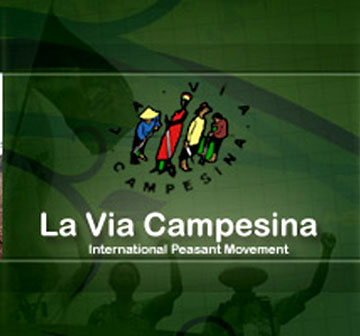編按:
這是「農民之路」(Via Campesina)組織,針對9月初於印度新德里召開的WTO小型部長會議所提出的說帖,針對農業貿易提出批判,並且提出關於糧食主權的具體作法。
在災難頻仍的當今,糧食主權是越來越重要的議題,感謝台灣農村陣線與綠色陣線的朋友翻譯、校對,與台灣的朋友分享。

照片來源:農民之路網站
給所有受邀參與下屆於新德里舉辦的小型部長會議的部長們
文稿:La Via Campesina(農民之路)
譯者:洪翠苹(台灣農村陣線) 校訂:陳思穎(綠色陣線)
農民之路,一個由小型與中等規模的農民、無地農民、鄉村婦女、原住民、鄉村青年與農工等組成的國際運動,希望將我們草根的立場傳達給9/3-4於新德里舉行的WTO小型部長級會議。
好長一段時間,我們致力於提升農民對自由化強烈負面影響其生計的意識.1999年,在西雅圖舉行世界貿易組織部長會議期間,我們對新自由主義的農業政策摧毀小農經濟及其對社會所引發的深遠危機表達關切。
在2005年香港世界貿易委員會(WTO)會議上,我們再次動員,因為這是一個生死存亡的關鍵,每天都有負債累累的農民被迫走上自殺一途。當糧食危機於2006年爆發時,我們認為它驗證了新自由主義是一個失敗的政策。
我們希望此事件的爆發能引來真正的國際政策的轉變。.今日,聯合國糧農組織(FAO)評估仍有愈來愈多、超過10億以上的人口正在挨餓,而將近約15億的人口正受到現在糧食危機的波及深陷飢餓的泥沼裡。
因為政策上的改變對我們分佈於世界各地的成員來說是極其重要的,所以我們再次呼籲大家向國際聲明拒絕WTO進一步開放糧食貿易。政府提出的政策應確保農民生計並生產足夠農民及消費者所需的糧食。然此一訴求在現存的WTO架構下的運作中無法實現,因此我們要求農業完全地脫離WTO的執行範疇。
WTO不應該再處理糧食與農業的問題了,因為:
進一步的開放農業將只會加重而不能解決氣候、糧食、耕地與金融危機。它將重創那些經濟與人口皆高度仰賴農業部門的弱勢國家的穩定。像印度,其國內有三分之二的人口是仰賴農業維生。
全球貿易系統不讓政府保護農民免於財團的掠奪行為,卻讓農企業享有更多的支配自由。WTO,與雙邊及區域自由貿易協議允許富國的農企業出口商及財團接收大量的農產品補貼,而後將其受補貼後的廉價商品傾銷到發展中或已發展國家的市場上。
這樣的傾銷方式使北方與南方的小農置身於不利的位置,進而促使生產者提供量多但品質粗糙的產品予北方及南方的消費者。在現在的杜哈回合中,已發展國家如美國,將進一步提高他們在農企業遊說上的支出,而發展中國家則被迫減少對其境內農民的生產保護及進一步開放市場,這使得原已處於弱勢的農民處境更為險惡。
即便是應該保護一些發展中國家的農業所謂的”安全”機制,也都是完全無效的,像是在WTO杜哈協議中提出的特殊產品與特殊保障機制就是一個例子。在現存的提案下,像印度就只能在降低關稅的情況下保護8或9種穀物。此種保護狀況在一個超過15個以上的農業氣候區的國家根本不算什麼。
況且,最近一次的草案上,與先前的提案一樣,提出了一種高度無效的和不切實際的機制來防止發展中國家的進口激增。這機制無法處理美國與歐盟因補貼農企業制度所產生的長期性低價問題。同時,它也沒有考量到大多數的發展中國家並沒有能力有效監測某段時間內激增的進口量。因此,這類安全機制絕對不可能平衡自由化在農業裡所帶來的負面影響。
糧食主權是我們取代農業貿易自由化的出路
糧食自主是人民健康與耕作土地的權利,透過較符合生態與永續的適當方式生產糧食,同時,人民有權去定義他們的糧食與農業系統。這樣的理念完全抵觸了WTO將市場與財團需求置於糧食系統與政策核心的規則。
為能真正降低全球貧窮、飢餓、營養不良的現況,我們不僅要求將農業退出WTO的議定裡,同時我們也呼籲您支持下列這些具體建議:
在國家層級上,強而有力地保護並支持用以供應國內消費,以家戶為單位的永續糧食生產模式,而此一模式必須得以在全球貿易系統中運作。
l 全球貿易系統必須懲戒財團的不當行為,並終止其對任何產品進行傾銷。
l 明確禁止任何以糧食做為投機炒作的行為。
l 新的市場規則-糧食生產政策必須要控制並穩定農業價格。
l 新的農業改革確保農民取得農業所需資源(農田、領地、水、種子、牲畜與生物多樣性)是為生產國民所需糧食,而不是大型的農企業用這些資源生產糧食以出口。
這些方法若能一起實行,將能啟動這個極需變革的全球糧食系統,並為糧食自主跨出一重要進展。
以下為英文信的原文
To all Ministers invited to the next mini-ministerial in New Delhi,
copy To Mr Pascal Lamy – General Director of WTO
copy to Ambassador David Walker, Chairman of the Special Session of Committee on Agriculture.
La Via Campesina, an International movement of peasants, small and medium-size farmers, landless, rural women, indegenous people, rural youth and agricultural workers, would like to deliver a message from the grassroots to the mini-ministerial meeting that will be held in New Delhi on September 3-4.
For a long time, we have worked to raise awareness of the very strong negative impacts liberalization has had on farmers’ livelihoods. In 1999, during the World Trade Organization (WTO) ministerial meeting in Seattle, we expressed our concerns about the destruction of our family farm economies and the profound crisis in our societies due to neo-liberal agricultural policies. Again, during the last WTO Conference in Hong Kong in 2005, we mobilized ourselves because the situation came to a point where indebted farmers were daily being pushed to the point of committing suicide. When the food crisis burst out in 2006, for us it was such a clear demonstration of the failure of neoliberal policy. We hoped it would lead to a real shift in international policies. But today, the FAO still estimates that over one billion people are now going hungry, with about 150 million more people experiencing hunger as a result of the current food crisis.
Since a change in policies is of vital importance for all our members around the world, once again we call you to clearly reject a further liberalization of trade in food in the WTO. Policies that will safeguard farmers’ livelihoods and food security for farmers and consumers are needed. As this is impossible within the current rules and proposals of the WTO, we want agriculture to be definitely taken out of the WTO.
The WTO shouldn’t deal with food and agriculture any more because:
Further liberalization of agriculture will exacerbate rather than resolve the climate, food, agrarian and financial crises. It will severely increase the vulnerability of many countries whose economies and populations depend on the agriculture sector. In India for instance, two-thirds of the population are dependent on agriculture.
The global trade system does not allow governments to protect farmers from predatory corporate behaviour, but rather gives large agribusiness greater free reign. The WTO, along with bilateral and regional “free trade” agreements allows agribusiness exporters and corporations in rich countries to receive large subsidies for production and to then dump their products into developing and developed country markets. This puts Northern and Southern small-scale family farmers at a disadvantage as well as misleads Northern and Southern consumers by providing industrially mass-produced, low quality food. Under the current Doha round developed countries like the US will further increase their payouts to agribusiness lobbies, while developing countries will be forced to further reduce protections and increase market access, putting in danger their already vulnerable farming peoples.
Even the so-called “safety” mechanisms supposed to protect some developing country agriculture such as Special Products and Special Safeguard Mechanisms in the WTO Doha deal are totally ineffective. In the current proposal, India for example can only protect eight or nine crops from tariff reductions. This is nothing in a country where hundreds of crops are being planted in over 15 agro-climatic zones! Moreover, the latest draft, as with the earlier ones, proposes a highly ineffective and impractical mechanism to prevent import surges in developing countries. This mechanism doesn’t deal with the chronic problems of low prices that the US and EU’s subsidy regime create. Nor does it take into account that most developing countries do not have the ability to monitor volume-based import surges in time for the measure to be effective. Therefore, such “safety” mechanisms have absolutely no possibility to counterbalance the negative impacts of the increasing liberalization in agriculture.
Food Sovereignty is our alternative to trade liberalization in agriculture.
Food sovereignty is the right of peoples to healthy and culturally appropriate food produced through ecologically sound and sustainable methods, and their right to define their own food and agriculture systems. It’s in total contradiction with the WTO rules that put the demands of markets and corporations at the heart of food systems and policies. To reach a real reduction of global poverty, hunger and malnutrition, not only do we ask you to take agriculture out of the WTO deal but we also urge you to support the following concrete proposals :
- Strong protections and support for sustainable family farm based food production for domestic consumption on the national level that must be allowed for within the global trading system.
- A global trading system that disciplines corporate behaviour, and puts an end to dumping. A clear prohibition of any speculation on food.
- New regulations on the markets – policy of production control (supply management) to stabilize agricultural prices.
- Real agrarian reforms to assure that farmers who produce food for the population have access to agricultural resources (lands, territories, waters, seeds, livestock and biodiversity) rather than big businesses which produce for export.
These measures, taken together, would truly start a strongly needed transformation of the global food system, and deliver important progress towards the achievement of Food Sovereignty.
Henry Saragih Yudhvir Singh
General Coordinator of Member of International
La Via Campesina Coordinating Committee of
La Via Campesina
在〈農民之路給WTO部長會議一封信〉中有 2 則留言